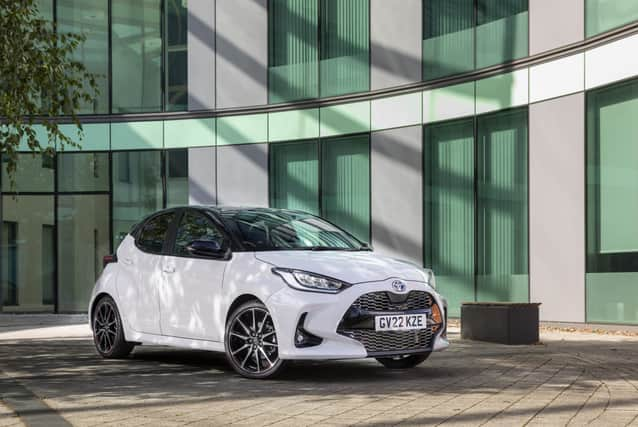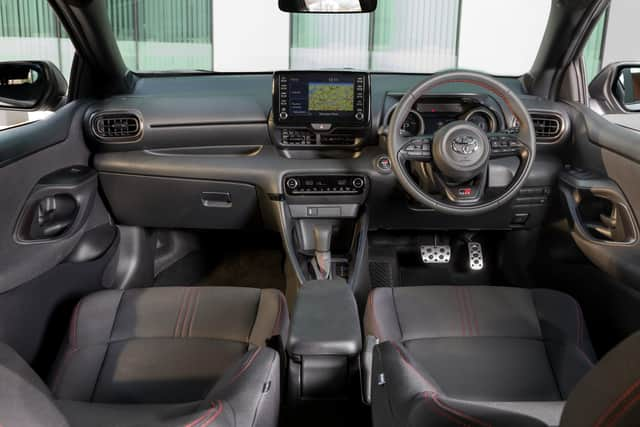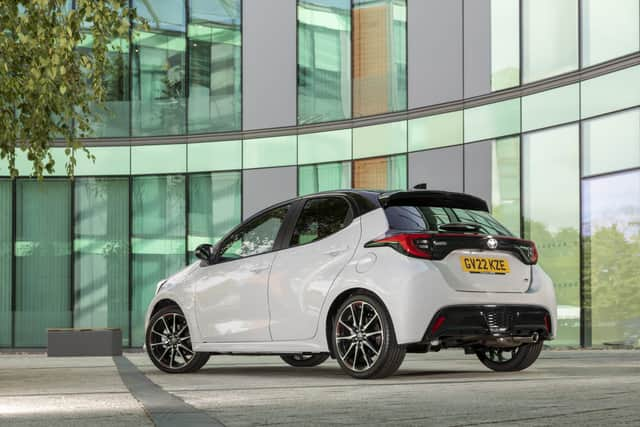2022 Toyota Yaris review: hybrid supermini brings high-tech specification and impressive economy


The first generation Toyota Yaris was a bit of a revelation when it was launched in 1999.
Japan’s answer to the Ford Fiesta was a masterpiece of packaging, with heaps of smart storage, a funky centrally mounted digital instrument display, sliding rear bench and ultra modern and efficient 1.0-litre engine.
Advertisement
Hide AdAdvertisement
Hide AdCritics were suitably impressed and named it the European Car of the Year 2000. Jump forward to 2021 and the new fourth generation earned the same accolade for many of the same reasons.
At its heart, the Yaris’s offering hasn’t changed - it’s still a smartly packaged supermini with a modern drivetrain and the rock-solid reputation of Toyota at its back. Of course, after 22 years some things have changed. It’s a lot bigger than it once was, there’s a heap more technology on board and the VVT 1.0-litre has been replaced by a full hybrid powertrain.


Design
Visually, it’s hard to see much connection between first and fourth gens, especially in our GR Sport test car. This is not to be confused with the Toyota GR Yaris, which is a very different beast. GR Sport is like Hyundai’s N-Line or Ford’s ST-Line - it’s a trim and styling package that dresses up regular models with some of the trappings of the true performance models. In fact, it’s a straight rival to the Fiesta ST-Line.
So the Yaris GR Sport has flashier 18-inch alloys, a mesh grille, rear spoiler and sports seats but under the skin its a regular Yaris.
Advertisement
Hide AdAdvertisement
Hide AdExternally the new Yaris is a real looker regardless of trim level. It has gone from a pretty bland blob to something much more purposeful and interesting. Even bog standard cars have something of the muscular rally model attitude.
Interior
The interior has more in common with previous generations, although it is all new for this fourth-gen car.


Much like the Mk1, it doesn’t have the most eye-catching interior. It’s very sensible and practical feeling but there’s a lot of black and grey plastic without much to lift it. The same could be said about the Fiesta but things like Vauxhall Corsa and Seat Ibiza have a bit more flair, and a Skoda Fabia has a more premium look and feel.
Touches like the small touchscreen mounted high in chunky plastic surround and the basic instrument display are a step behind the Corsa, Fabia and Ibiza in terms of design but it still feels solid and sensible in a dependable Toyota way. There are plenty of practical touches, from big storage pockets to a well-placed phone tray and what it lacks in flair it makes up for in robustness.
Advertisement
Hide AdAdvertisement
Hide AdIt also offers decent space for the class. The Renault Clio and Skoda Fabia have more room in the back seats but it’s easily a match for the Corsa and Fiesta and feels reasonably spacious all-round. The Yaris’s boot is 286 litres, putting it at the bottom end of the segment with the Corsa and Fiesta, while the Fabia and Clio boast around 100 litres more.
Engine and driving
Keeping things simple, the Yaris comes with only one engine/gearbox option. The 1.5-litre full hybrid with an E-CVT produces 114bhp and offers up to 64mpg and is pitched directly against the Renault Clio E-Tech and Honda Jazz full hybrids.
The all-new hybrid system works well but you’d expect nothing less from one of the first brands to embrace the tech. It pulls away smoothly, quietly and with decent grunt under electric power and the transition to petrol mode is pretty smooth. The engine is a bit gravelly and noisy, especially at lower speeds but overall refinement is pretty good if you keep your inputs measured.
It feels competent and settled at higher speeds but is most at home in urban environments, where Toyota says it can operate in EV mode up to 80% of the time. That being said, the car’s new platform makes it surprisingly responsive and fun to drive. It’s not a match for the Fiesta but feels pretty light and nimble and rides better than a Fiesta ST-Line, although not as well as a Clio or Citroen C3.
Price and spec
Advertisement
Hide AdAdvertisement
Hide AdPrices for the Toyota Yaris start at £21,450, rising to £24,420 for our range-topping GR Sport. All models get alloy wheels, reversing camera, automatic air con, a seven-inch touchscreen with smartphone connectivity and the packed Toyota Sense suite of driver assistance tech that brings everything from adaptive cruise control to intersection turn assistance to avoid collisions at junctions. The extra money unlocks bigger wheels, sports seats, keyless entry/start, a bigger touchscreen, dual-zone climate and six-speaker sound system and puts it in contention with the more powerful Ford Fiesta ST-Line, Vauxhall Corsa GS Line and Skoda Fabia Monte Carlo.
Verdict
Is it better than those? Probably not in every way, but it’s definitely worth considering against them. Other cars are cheaper, offer more space, sharper interior design and a more engaging drive but the Yaris is blessed with good looks, a smart efficient drivetrain, practical design and some of the latest in convenience and safety technology.


Toyota Yaris GR Sport
Price: £24,420 (£25,640 as tested); Engine: 1.5-litre, three-cylinder, petrol with hybrid electric motor; Power: 114bhp; Torque: N/A; Transmission: E-CVT; Top speed: 109mph; 0-62mph: 9.7 seconds; Economy: 57.6-64.2mpg; CO2 emissions: 99-112g/km
